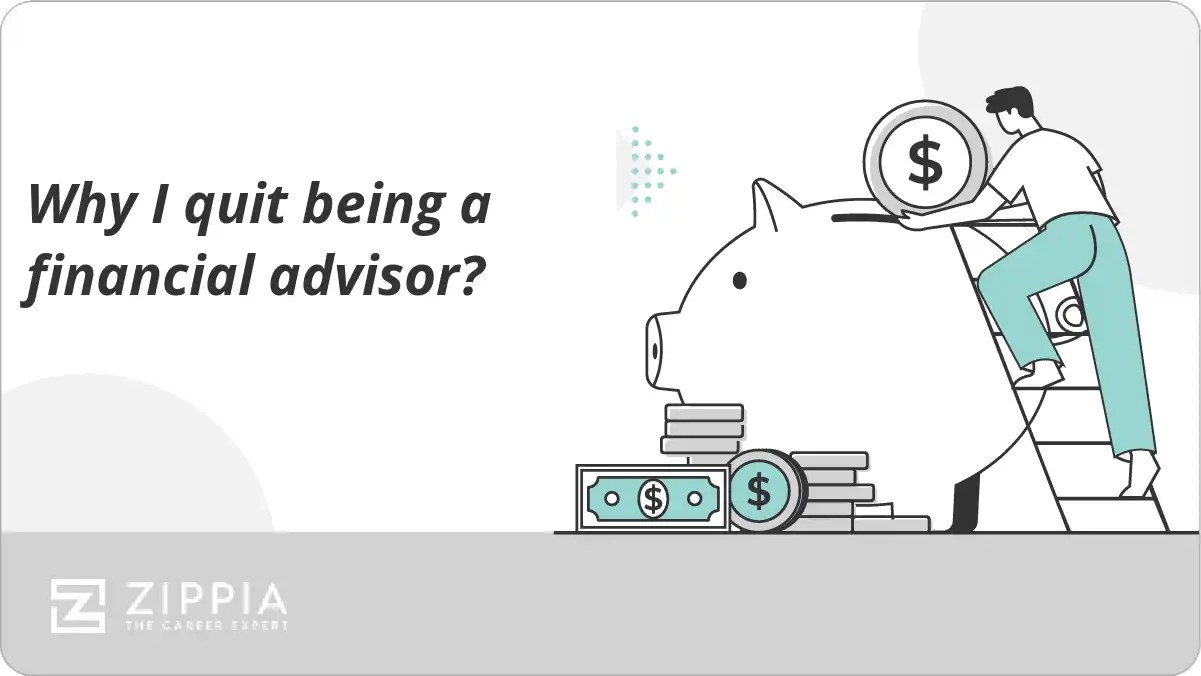FAQs
I felt out of touch with my work. I felt as though it wasn't a place where I could hone my personal strengths and larger role. I was drowning in endless tasks and projects that never seemed to tie together. Like any time you make a big leap, I wasn't sure I was making the right decision.
Why do people quit being a financial advisor? ›
Lack of work ethic. It takes a lot of hard work and discipline to break into a career as a financial advisor. While many are willing to work hard for a period of time, fewer are willing and able to maintain the high-level work ethic required to survive and thrive as a successful advisor.
Why do people fire financial advisors? ›
As a financial advisor, it takes hard work to attract clients and even more work to keep them. Clients can part ways with their advisors due to poor communication, mismatched expectations, underperformance, lack of personalized advice, trust issues, high fees, and inadequate financial education.
Why not become a financial advisor? ›
Steep Learning Curve. Financial advising is far from an easy job. You'll need to master the basics to get any clients and understand what you're doing. However, it goes beyond that - this industry is constantly evolving, so you'll need to stay up to date in your education.
How many people fail at being a financial advisor? ›
2. The Statistics: 80-90% of financial advisors fail and close their firm within the first three years of business. This means only 10-20% of financial advisors are ultimately successful.
When should you leave your financial advisor? ›
Poor performance, high fees, strained communication and stagnant advice are among the reasons to look for a new advisor. Kevin Voigt is a former staff writer for NerdWallet covering investing.
How long does the average client stay with their financial advisor? ›
It costs up to five times more to acquire new clients than to keep current ones. Yet, 20% of clients leave their advisor within the first year of signing. And 25% leave after year two. For new advisors, poor client retention affects both their income and confidence.
Is financial advising a dying industry? ›
The financial services industry is continuously evolving, leading to questions about what the future of financial advisors might look like. The good news is that the employment outlook for personal financial advisors appears bright, with an expected 15% growth rate through 2031.
Is financial advisor a high stress job? ›
How stressful is being a financial advisor? Being a financial advisor can be highly stressful due to the responsibility of managing clients' financial futures, market volatility, and the need to make crucial decisions under pressure. Stress levels can vary based on individual clients and market conditions.
What is the disadvantage of being financial advisor? ›
The drawbacks include high stress, the hard work needed to build a client base, and the ongoing need to meet regulatory requirements. This is a lucrative career, but it's one with a high burnout rate.
While managing a client's portfolio may be a very straightforward endeavor, managing their expectations can be much harder. Many clients have unrealistic expectations when it comes to investment returns and interest rates. For starters, clients are often not financial professionals.
Why do financial advisors make so much money? ›
Commissions. In this type of fee arrangement, a financial advisor makes their money from commissions. Advisors earn these fees when they recommend and sell specific financial products, such as mutual funds or annuities, to a client. These are often payable in addition to the above client fees.
Do financial advisors have a bad reputation? ›
Financial advisors and insurance agents may have a certain reputation in many circles. While I believe the majority are honest, some advisors may give the rest a bad name by focusing on the commission instead of the client. And, even if you meet an honest advisor, how can you know they will do the job suited for you?
What is the average age of financial advisors? ›
According to various studies and publications, the average age of financial advisors is somewhere between 51 and 55 years, with 38% expecting to retire in the next ten years.
Are financial advisors struggling? ›
The retention rate is low: By the fifth year, only 15-16% of advisors will still be in business. Over 90% of financial advisors in the industry do not last three years. Putting it simply: 9 advisors out of 10 would fail!
What is the biggest challenges for financial advisors? ›
Financial advisors face challenges such as market volatility, regulatory changes, client expectations, and technological advancements.
What percentage of financial advisors quit? ›
Over 90% of financial advisors in the industry do not last three years. Putting it simply: 9 advisors out of 10 would fail!
What happens when your financial advisor quits? ›
Your money remains in place, and if you choose to leave the team, you can just transfer your money to another advisor. So, in short: you won't lose your money and can decide on what to do next with your portfolio.
Why don't people trust financial advisors? ›
Many people think using a financial advisor is expensive and only for the wealthy, said certified financial planner Douglas Boneparth, president and founder of Bone Fide Wealth in New York. Plus, people may not understand the different functions a financial advisor can provide, he added.
